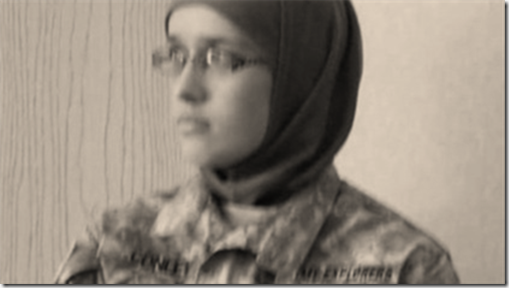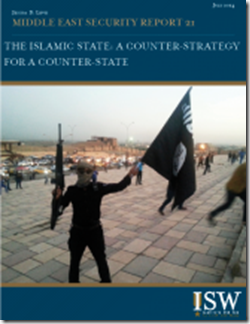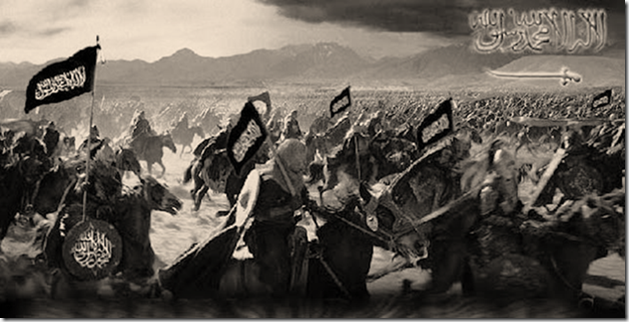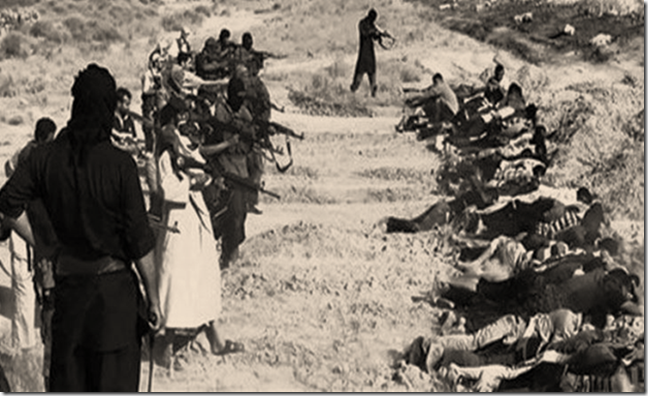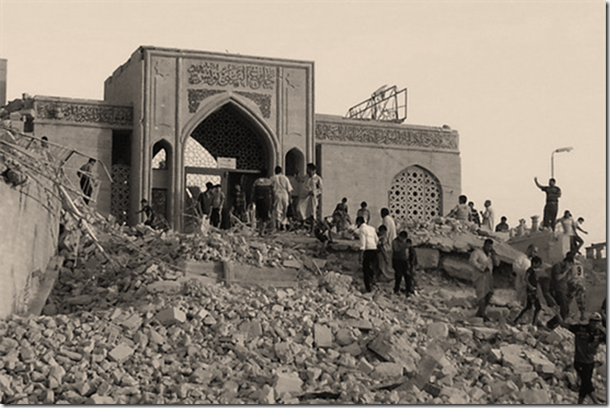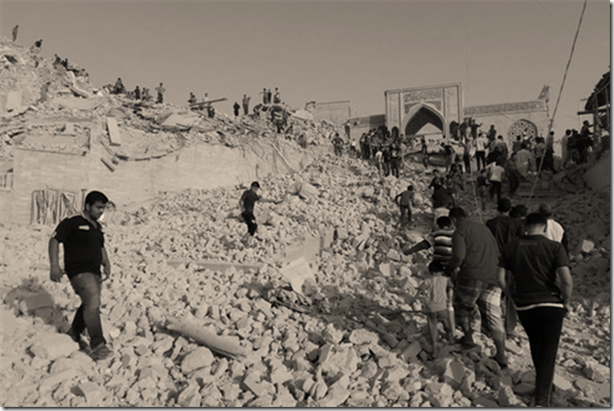19-year-old Arvada woman, Shannon Maureen Conley, charged with aiding ISIS terror group, FBI says
Alan Gathright
7NEWS Denver | Jul 2, 2014
DENVER – The FBI says a 19-year-old Colorado woman has been arrested while trying to board a flight at Denver International Airport with the goal of meeting with a terrorist group called the Islamic State of Iraq and Syria, also known as ISIS.
A federal criminal complaint states that between Sept. 7, 2013 and April 8, 2014, Shannon Maureen Conley, together with others, tried to provide material support and resources, including personnel and expert advice, to a foreign terrorist organization.
Conley, a Muslim convert, was arrested April 8 at DIA after telling FBI agents she was traveling to Syria to use her American military training from the U.S. Army Explorers to aid Islamic militants waging jihad — or holy war — even though she knew that it was illegal, according to federal court records released Wednesday.
She said "legitimate targets of attack" included U.S. military bases, government employees and public officials, the documents say.
Against her parents wishes, Conley planned to marry a Tunisian man, who was fighting in Syria for ISIS, an al-Qaida splinter group. She’d met the man online and communicated with him on Skype.
Conley has been charged with conspiring to help a foreign terrorist organization. She’s being held in Denver County Jail without bond.
ISIS insurgents have been fighting to topple the governments of Iraq and Syria.
— Conley raised suspicions at church —
Authorities began investigating Conley on Nov. 5, 2013, when the pastor at Faith Bible Chapel in Arvada called local police and the Colorado Bureau of Investigation to report a teen had been spotted suspiciously taking notes at the church’s main campus at 6120 Ward Road on several Sundays at October, according to a federal affidavit supporting the criminal complaint.
Church officials have a heightened awareness about security because Faith Bible Chapel was the scene of a shooting in December 2007 when a man named Matthew Murray opened fire at the church’s Youth with a Mission Training Center, killing two missionaries. A few hours later, Murray went on a shooting spree at the New Life Church in Colorado Springs, killing two more people. He was shot by a church security guard and eventually took his own life.
So Faith Bible Chapel staff reacted quickly when they believed Conley was taking notes on various locations and the layout of the campus, the affidavit said.
Church staff approached Conley and asked to see her notes, but she refused.
Conley then became confrontational with FBC staff, citing her own Islamic religious views, church officials told federal investigators.
"Conley made spontaneous statements to church staff to the effect of: ‘Why is the church worried about a terrorist attack?’ and, that terrorists are: ‘… not allowed to kill aging adults and little children,’" the complaint said.
Church officials told Conley not to return to the church campus.
— FBI interviews Conley in November —
On Nov. 7, 2013, an Arvada police detective and an FBI agent interviewed Conley, asking her why she has been visiting Faith Bible Chapel.
Conley said, "I hate those people." She added that she initially started attending Sunday services and taking classes at FBC because she wanted to meet people of other faiths and learn about them.
But Conley said she did not share her Islamic religious views or wear her hijab, a head covering worn in public by Muslim women.
Conley told the investigators she does not like Israel or FBC’s active and vocal support for Israel.
Conley said she noticed she was being followed by church staff on the campus and felt they treated her like a terrorist. Conley told the investigators that she reasoned that, "If they think I’m a terrorist, I’ll give them something to think I am," according to the affidavit.
She started keeping a notebook and acted like she was diagramming the church to alarm them. Conley soon got into an argument with the pastor and was asked to leave.
— Conley tells FBI she supports Jihad —
Conley said that Jihad to her is war against "kafir" (which the affidavit describes as a derogatory Arabic term for non-Muslims) to protect Muslim lands.
The investigators asked her opinion about harming innocent people while waging Jihad and Conley stated that it depended on the circumstances.
"To Conley, it is okay to harm innocents if they are part of a target. She felt that if wives, children, and chaplains visiting a military base are killed during an attack, it is acceptable because they should not have been at a legitimate target. She repeatedly referred to US military bases as ‘targets,’" an FBI agent wrote in the affidavit.
On Dec. 6, 2013, Conley was again interviewed by FBI Special Agent Karim Khomssi and another agent.
— Conley joined U.S. Army Explorers —
Conley told the FBI she joined the U.S. Army Explorers to be trained in U.S. military tactics and in firearms. She said she intended to use that training to go overseas to wage Jihad, according to the affidavit.
Conley said she previously wanted to serve in the U.S. military, but no longer wanted to because she felt the military would not accept her because of her religious beliefs and her wearing of a hijab and niqab.
"Conley stated she wanted to wage Jihad and would like to go overseas to fight," the affidavit said. She added that if she’s not allowed to fight because she’s a woman, she would use her medical training, as a licensed nurse’s aide, to help Jihadi fighters.
"According to Conley, it is acceptable to attack westerners when engaged in ‘defensive Jihad.’ Conley stated that legitimate targets of attack include military facilities and personnel, government facilities and personnel, and public officials," the affidavit stated.
When agents asked if her notion of legitimate targets includes law enforcement, Conley replied that it does, the affidavit said. Conley said, "Law enforcement is included because police enforce man-made laws that are not grounded in God’s law. Conley stated targets to be avoided include women, children, and the elderly," the affidavit said.
— Conley cannot be dissuaded by FBI —
Over the next five months, the FBI repeatedly interviewed Conley as she underwent U.S. Army Explorers training in Texas in early February.
During a March 27 interview, two FBI agents made an "overt attempt to dissuade Conley from violent criminal activity and give her the opportunity to turn away from her intention to participate in supporting terrorist activities."
Special Agent Khomssi "admonished Conley twice in the conversation that travel with intent to wage Jihad may be illegal and result in her arrest. Conley told SA Khomssi said she would rather be in prison than do nothing" to help the Jihadi cause, the affidavit said.
Conley earlier showed the agents a book called "Al-Qaida’s Doctrine for Insurgency: Abd Al-Aziz Al-Muqrin’s A Practical Course for Guerilla War."
"The book had several passages underlined by Conley, including motorcade attacks and waging guerilla warfare. Conley stated that attacking a motorcade in the US was not viable because security in the US is too good. Conley thought she could plan such an attack, but not carry it out," the affidavit said. "Conley liked the idea of guerilla warfare because she could do it alone."
"When asked if she still wanted to carry out the plans, knowing they are illegal, Conley said that she does," the affidavit said.
The agents repeatedly asked Conley if she’d consider helping Muslims by doing humanitarian work, like using her nursing skills with the Red Crescent Society.
"Conley stated she has no interest in doing humanitarian work. Conley felt that Jihad is the only answer to correct the wrongs against the Muslim world. Conley said she preferred to wage Jihad overseas so she could be with Jihadist fighters," the affidavit said.
— Plans to meet ISIS fighter in Middle East —
Conley and her parents told FBI agents that she planned to travel to the Middle East to meet her "suitor," a 32-year-old Tunisian man who is an ISIS fighter in Syria. The teen said a one-way airline ticket had already been purchased for her.
In February, the FBI agents met with the teen’s parents, John and Ana Conley, with whom she lives in Arvada.
John Conley told the agents his daughter had "described Jihad to her father as struggles to help the oppressed or the poor."
But the teen also expressed some doubts.
"Conley explained to her father she felt conflicted with what she thought Islam required of her. Conley believed she, as a Muslim, needed to marry young and be confrontational in her support of Islam. She conceded her knowledge of Islam was based solely on her own research that she conducted on the Internet," the affidavit said.
The parents said that they owned guns and that Shannon and a girlfriend had recently taken one of their rifles to practice marksmanship at a local shooting range.
The agents warned the parents that "their daughter has expressed, to overt FBI agents, her intention to travel overseas and commit violent Jihad." By "overt," the agents meant they weren’t operating undercover and she clearly knew to whom she was talking.
The agents asked the parents to engage their daughter in "candid conversation" to learn "her true views on Islam." The agents also asked the parents to encourage Shannon to speak with "elders at her mosque to discuss more moderate views," the affidavit stated.
— Conley’s family refuses to bless marriage —
After talking with his daughter, John Conley told an FBI agent her views on Islam "were far more extreme than he had previously thought."
The father said he found Shannon talking with her Tunisian suitor on Skype. At the time, Shannon and the man asked John Conley for his "blessing" for them to marry and for her to travel to Syria to marry the man as soon as possible.
The father told the FBI he denied both requests and Shannon and the man appeared surprised.
In April, John Conley called an FBI agent and reported that he’d found Shannon had a one-way ticket to fly from Denver International Airport to Turkey on April 8.
He and his wife confronted Shannon, telling her that they didn’t provide their blessing, nor did they support her travel to Syria and marriage.
"[Shannon] Conley was aware that Islam required the blessing of her family for her marriage, but told John she had thought about it and disagreed with Islam on the issue and was going to travel and marry anyway without their blessing," the affidavit said.
The FBI learned that she was scheduled to fly from Denver to Frankfurt, Germany and then on to Istanbul, Turkey, and then to Adnan, Turkey, where it is only a three-hour drive to the Syrian border.
On April 8, the FBI followed Shannon Conley as she traveled to DIA, checked in her bags and walked to the gate for her United Flight to Frankfurt. Agents arrested her as she was walking down the jetway to board the plane.
In her luggage, agents found several CDs and DVDs labeled "Anwar al-Awlaki," a senior Al Qaeda leader and recruiter who was killed by a CIA-led U.S. drone strike in Yemen in 2011. Agents also found a folder with materials about providing first aid in the field. The teen was also carrying a list of contacts, including phone numbers for a person whose name was blacked out in the affidavit.
The FBI also searched Conley’s Arvada home.
United States of America v. SHANNON MAUREEN CONLEY [CRIMINAL COMPLAINT]
I, the complainant in this case, state that the following is true to the best of my knowledge and belief:
Between and on or about September 7, 2013 through April 8, 2014, inclusive, in the State and District of Colorado and elsewhere, the defendant, Shannon Maureen CONLEY, together with others, did knowingly attempt to provide material support and resources, to wit: personnel (1 or more individuals who may be or include oneself) and expert advice or assistance, to a foreign terrorist organization, specifically the Islamic State of Iraq and Syria (“ISIS”), also known as the Islamic State of Iraq (“ISI”) or Al-Qaeda in Iraq (AAQI@), continuously designated since December 17, 2004, knowing that the organization was a designated terrorist organization, that the organization had engaged in and was engaging in terrorist activity and terrorism, and the offense occurred in whole or in part within the United States.
All in violation of Title 18, United States Code, Section 2339B.
View the complaint @ http://localtvkdvr.files.wordpress.com/2014/07/u-s-v-conley.pdf
My Neighbor the Terrorist: A Bizarro Cinderella Story
Anne Evans
American Thinker | July 19, 2014
It’s a Bizarro Cinderella story. Nineteen-year-old Colorado girl, Shannon Conley, meets thirty-two year old Tunisian terrorist online. He asks her to marry him. She enthusiastically accepts and allegedly pledges to devote her life, (between most likely having innumerable babies), to using her nursing skills to bring wounded terrorists back to health.
There’s only one little hitch. This April, the U.S. Marshals showed up at Denver International Airport and arrested Miss Conley before she could hop aboard a jet bound for the Middle East.
Miss Conley lived only a few miles down the road from me. She attended our local high schools, (3 of them before dropping out for a GED), and briefly attended Faith Bible Church, which I drive by every day. Despite her rocky high school years, she ended up at a private university, Regis, and was working as a certified nurse aide. Not bad for a nineteen-year-old in this economy.
How does a local girl born and raised in normalcy start ranting about terrorism? U.S. Marshals laid the transformation at the feet of radical Islam. In a series of meetings with Miss Conley, Marshals tried to dissuade her from terrorism. Accordingly, they asked her to speak with her local mosque and have the elders there teach her about why terrorism is not commanded by the Qur’an.
Miss Conley doesn’t seem to have been interested in speaking with the Mosque elders. (She admitted the only things she knew about Islam were learned online.) Instead, despite having converted to Islam, she hung out at Faith Bible Church. People there thought she was trying to blow the place up. According to her, she first went there to learn about Christianity and then had fun scaring them.
Admittedly, Faith Bible Church, and all the churches in my community, are a bit on the jumpy side as far as security goes. I remember first attending church in Arvada in 2011 and noticing that an off-duty cop sat in the back every Sunday. My eyes widened when I learned he had a concealed gun on his person. The vigilance is because of a sad shooting incident that occurred at a local church-affiliated function in 2007.
Since Miss Conley barely even went to Mosque services yet transformed from regular Colorado girl to radical Muslim in six months, did she really get deceived by violent religious ideas? Is her flight into terrorism actually a result of religious indoctrination? I doubt it. I think her case has more in common with domestic violence victims.
Women who become victims of domestic violence fall into classic types. A significantly older man preys on a teenaged or young 20s girl. Miss Conley’s 19. Terrorist Fiancé is 32.
The victim is usually attracted to the abuser’s powerful personality and makes her life revolve around him. Miss Conley was moving halfway around the world and giving up all her family.
The abuser engages in mind control to get his victim to follow his every whim. Miss Conley was even willing to kill her own countrymen for her fiancé. Yet, Miss Conley said she didn’t want to kill anyone personally. She preferred to nurse the terrorists back to health. Terrorists enjoy killing people; abused women blindly serve their man.
Miss Conley seems more concerned about pleasing Terrorist Fiancé than following Islam. According to Islam, you need the father’s permission to marry. Miss Conley’s dad was wise enough to give an emphatic “no” when Terrorist Fiancé skyped him to ask for his daughter’s hand in marriage. Yet, far from being bound by religious conviction, Miss Conley shrugged that off to fly to meet Terrorist Fiancé anyway.
Abusive men are notorious liars. Miss Conley said nothing of Terrorist Fiancé having other wives. But the Qur’an allows four wives (plus raping female slaves). Do you really think a notorious terrorist made it to age thirty-two without taking any other wives?
Some papers are complaining about Miss Conley’s imprisonment saying, how can you punish someone for a crime they haven’t committed yet? While being in jail isn’t pleasant, the U.S. Marshals rescued Miss Conley. Radical Muslims take the Quranic command to beat your wife very literally. Add emotional abuse to that equation, and a woman can’t even leave the house without her husband’s permission.
Miss Conley might have had honeymoon visions of romance, but in reality she was in for a nasty fate. Despite embracing radical Islam, she wouldn’t have been able to erase the self-respect she was raised with in only six months. Many of the abuses the other women in the camp would have been used to, (imprisonment in the house, husbandly beatings, unwanted polygamy and a cheating husband), Miss Conley would have rebelled against. This “rebellion” would have given Terrorist Fiancé even more reason to beat her, starve her, or worse.
Miss Conley is in an American jail where she’s not getting beaten, is served three meals a day, and can read and pursue some educational interests. The reason the U.S. Marshals found her before she got on the plane, (i.e. the reason she is in jail right now), is because her dad called the Marshals. Dads don’t call the police on their little girls to save the nation. Dads call the police on their daughter when they think the alternative would hurt their girl more.
Miss Conley might hate the U.S. Marshals or be furious at her parents right now, but they saved her life. Terrorist Fiancé would have treated her much worse.
So this is my advice to the U.S. Marshals. What Miss Conley needs is not a moderate Imam speaking to her about Islam. What she needs is an experienced counselor telling her about the warning signs and mind control tactics in an abusive relationship.
Anne Garboczi Evans holds a Master’s in Counseling and specializes in working with domestic violence victims and teenage moms. She is also an author with Hartline Literary Agency and is currently working on a world religions book entitled, No Fear: My Tale of Hijabs, Witchcraft Circles, and the Cross.
Arvada teen tied to terror
Jesse Paul
Denver Post | July 3, 2014
An Arvada teenage girl arrested in April on suspicion of attempting to support al Qaeda and its affiliates including the Islamic State of Iraq and the Levant was warned for months by federal agents investigating her that her support could lead to her incarceration.
One FBI agent met with her seven times, trying to dissuade her from supporting jihad and suggesting that she instead commit herself to humanitarian work, court papers say.
Shannon Maureen Conley, 19, was taken into custody at the Denver International Airport by the FBI as she attempted to board a plane on her way to Turkey, according to Dave Joly, an FBI spokesman. The case against Conley was not unsealed until Wednesday because of an "ongoing, active investigation," when news of her arrest and alleged activities became public, according to the U.S. attorney’s office in Denver.
Investigators from the FBI’s Joint Terrorism Task Force investigated Conley for roughly eight months before arresting her April 8, according to a federal criminal complaint filed in the Denver U.S. District Court.
During that time, she repeatedly told federal agents who identified themselves and met with her on a near weekly basis from November to April that she was committed to waging jihad in the Middle East.
Conley went ahead with her plans, led by a man she met on the Internet who identified himself as a terrorist associated with ISIL and with whom she built a romantic relationship online as he encouraged her to travel to Syria to fight alongside him.
Even after federal agents met with her parents, warning them of their daughter’s radical beliefs, and even after her parents tried to dissuade her, Conley purchased a plane ticket to Turkey, where she planned to meet the man she met online, court filings say.
The U.S. attorney’s office in Denver declined to comment on the case, and attempts to reach Conley’s attorney, a federal public defender, were unsuccessful. If convicted, Conley could face up to 15 years in prison, a $250,000 fine or both.
In 2013, Conley encountered the man online and the two shared their views of Islam as "requiring participation in violent jihad against any non believers," according to court filings. The person, identified in documents as "Y.M.," told Conley that he was fighting in Syria with ISIL, which is one of several rebel factions locked in a bitter civil war with the Syrian government.
The two planned for Conley to provide support for ISIL and "fight should it become necessary," court documents say. In September, Conley joined the U.S. Army Explorers, a nonprofit youth exploration group, to be trained in military tactics and guns, court papers said.
Law enforcement began looking into Conley after a security guard and pastor at the Faith Bible Chapel in Arvada the site of a 2007 active shooter attack contacted police and the Colorado Bureau of Investigation to report that a woman had been wandering the campus taking notes, court records say.
The woman also became "confrontational" with church staffers when they asked to see her notes. The guard thought Conley was suspicious and that she seemed to be visiting the church in preparation for an attack.
An Arvada police detective and a special deputy U.S. marshall interviewed Conley in November about her time at the church, according to court documents. Conley told investigators that she hated "those people," specifically their support of Israel, and "if they think I’m a terrorist, I’ll give them something to think I am."
She also referred to U.S. military bases as "targets," according to court papers.
A month later, Conley was interviewed by an FBI special agent, at which point Conley said she was training in military tactics and that she hoped to share what she learned with Islamic jihadi fighters, a federal agent said.
A few weeks later, the complaint said, Conley told the FBI agent she was "ready to wage jihad in a year."
The agent interviewed Conley several more times over the next few weeks leading into 2014, during which time Conley repeatedly said that she wanted to travel to the Middle East and East Africa to wage jihad.
Federal agents warned Conley’s parents around February that their daughter’s beliefs were becoming alarmingly violent, according to the complaint. Her parents were "asked to attempt to engage Conley in candid conversation and to get her to expose her true views on Islam."
"We’ve been advised not to comment," Ana Maria Conley, the teen’s mother, told The Denver Post Wednesday evening. "We ask you to please respect our privacy."
When Conley told her parents on April 1 that she was leaving for Syria to marry a "soldier," her parents expressed their disapproval.
Seven days later, Conley headed to the airport and checked some bags. Inside them were CDs and DVDs labeled Anwar al Awlaki, who was an American dissident turned Islamic militant who was killed by 2011 drone strike in Yemen.
As Conley walked down the jetway to board her flight, federal agents arrested her.
Staff writer Kirk Mitchell contributed to this report.
Teen’s activities raised concern at Israel event
Kirk Mitchell
Denver Post | July 4, 2014
As an Arvada congregation prepared to welcome more than 1,000 area Jews into their chapel for an annual fall homage to the Holy Land last year, a young Muslim woman appeared to be plotting a terrorist attack in plain sight.
"It was very obvious. Her acts were just continually suspicious," said senior pastor George Morrison of the Faith Bible Chapel of Arvada.
Shannon Maureen Conley, 19, now faces a federal charge of material support to al Qaeda and affiliates including the Islamic State of Iraq and the Levant.
She was arrested in April after receiving military training and developing a close relationship online with an avowed terrorist who had invited her to join the jihad in the Middle East, according to court documents unsealed this week. Authorities began investigating Conley after learning of her unusual activities at the Arvada church.
Morrison, who had spoken to Conley and others who had interacted with her, said he thought Conley had a romanticized view of a religious jihad but wasn’t truly dangerous. However, because a 2007 murder spree had directly affected the church, members were compelled to call the FBI.
"I still think she falls in the category of a terrorist wannabe. I didn’t think she had the wherewithal to harm anyone … but we didn’t want to take any chances," he said.
Conley faces a maximum penalty of up to 15 years in prison, according to U.S. District Court records in Denver.
She was raised in Loveland and Arvada and attended Ralston Valley and Arvada West high schools. She later became a certified nurse’s aide.
The young woman had aspirations of serving in the U.S. military, but when she converted to Islam, she believed fellow soldiers wouldn’t accept a woman wearing a hijab and niqab, according to federal court records. In September, she joined the U.S. Army Explorers to learn how to handle guns. She believed her destiny was to join a Muslim suitor she met online and fight a guerilla war in the Middle East or to work as a nurse, she told the FBI.
But along the way, her enthusiasm for jihad frightened members of the Faith Bible Chapel still traumatized by what happened in 2007.
In early December that year, a shooter gunned down two people at Youth With a Mission, a missionary training center on the Faith Bible campus. The same man later killed two teenage sisters during a shootout at New Life Church in Colorado Springs.
Last year, some of Faith Bible’s members began making comments to security officers and Morrison about the Muslim woman who suddenly began attending services in September.
"It became apparent that she wasn’t interested in church doctrine," said Rhoda Schultz, Morrison’s assistant. Conley wore a burka covering her head and long flowing gowns, but she didn’t carry a Bible, some church leaders recalled.
"She was dressed in all black. She looked very much like you see an Arab woman," said Betty Miller, the church’s Kids of Faith director.
Unlike many people who visit the church for possible permanent affiliation, Conley became annoyed when approached by a church leader asking if she wished to attend a small gathering at a coffee shop with a church group of young, unmarried adults, Schultz said.
On Sundays, Conley would wander from one Sunday school class to another. She was taking notes and making drawings but seemingly not of church discussions, Schultz said. Members saw her walking the halls in a section where children attended separate Sunday school classes, always taking notes.
Morrison said church security officers took surveillance pictures of Conley. She became confrontational when security officers asked to see the notes, refusing to show them, according to court records.
Schultz said she spoke with Arvada police officers, who had attended Sunday services since the attack in 2007, and they explained that they were well aware of the issue.
In fact, "Pastor George" had already contacted local FBI agents about the woman’s suspicious activities. FBI agents began watching and investigating Conley’s activities in September.
Church leaders and security officers began getting more nervous about their new visitor as a well publicized annual fellowship, called Annual Israel Awareness Day, approached in October, Schultz said. Dating back more than 35 years, Faith Bible Chapel had invited area Jewish people to hear informative discussions about Israel. The congregation swells from about 1,000 to 2,700 that night.
Specifically with her in mind, church leaders established a new security protocol. Anyone with backpacks or large bags would be asked to open them for a quick inspection or take them to their cars.
When security officers asked to look inside her backpack, she refused, telling them "that’s none of your business," Morrison said. They asked her to take her backpack to her car, which she did.
The next month, in November, FBI agents introduced themselves to Conley, according to federal court records. Between November and April, she repeatedly vowed her support of a jihad and was openly antagonistic about Faith Bible because of its support for Israel.
After two months of her visits, it was apparent she was not interested in learning about the faith, and so when she refused to show security her drawings, that was the last straw, Morrison said. "We asked her to leave," he said.
Conley told an FBI agent that she hated "those people" at Faith Bible for their support of Israel, adding that "if they think I’m a terrorist, I’ll give them something to think I am."
Conley transferred to Jefferson County Public Schools from Loveland as an eighth grader and went to Drake Middle School beginning in 2008. After beginning her freshman year at Arvada West High in 2009, she bounced to Ralston Valley High in 2010 and then back to Arvada West in 2011. She received a GED in 2012.
She took college courses in the fall of 2012 at Regis University in Denver, where her mother, AnaMaria Conley, is an associate professor of economics.
Staff writer Zahira Torres contributed to this report.
